Television has never been better or more. Is Peak TV too much TV?

TV already had a golden age—the flowering of live television that lasted from the mid-1950s through the early 1960s. But it was nothing like this, the golden age we’re in now, dubbed the era of Peak TV in 2015 by John Landgraf, CEO of FX, under whose aegis the channel has aired, among other shows, Justified, The Americans, Fargo and Atlanta. Everywhere we turn there are shows so fine, so well-written and performed, that they have bled talent from the movie business. But nothing lasts forever, especially not golden ages, which, paradoxically, are most often undone by their very success. The movie studios’ last golden age, the era of New Hollywood, ran from the mid-1960s to the beginning of the 1980s and was buried by its own blockbusters—Jaws, Star Wars, et al. The era of Peak TV has already outlived New Hollywood by a good five years, if you date the former as most people do, from the premiere of The Sopranos in 1999. The money that comes with success, it turned out, was and is a double-edged sword. It can enhance quality, but more often it is the enemy of quality. Once big profits begin to rain down from box-office heaven, directors, actors and agents all want their share. Budgets go up, and risk aversion, the Ebola of golden ages, strikes. Nobody expects the current plenitude of quality TV to end tomorrow, but there are worrisome clouds on the horizon. In the Darwinian world of the entertainment business, little fish that fatten on creative success are food for big fish, which are in turn bait for even bigger fish looking for deeper, more lucrative ponds to conquer. Today, the waters are dark with sharks named AT&T, Disney, Apple and Google.
This story is from the {{IssueName}} edition of {{MagazineName}}.
Start your 7-day Magzter GOLD free trial to access thousands of curated premium stories, and 9,000+ magazines and newspapers.
Already a subscriber ? Sign In
This story is from the {{IssueName}} edition of {{MagazineName}}.
Start your 7-day Magzter GOLD free trial to access thousands of curated premium stories, and 9,000+ magazines and newspapers.
Already a subscriber? Sign In

THE MILD HANGOVER
Hangovers get a bad rap. We know. If you’ve gotten this far in the magazine, you’ve surely divined that we’re mildly hungover most of the time.

AN ELECTRIC FUTURE
Polestar, the minimalist electric Swedish car brand, turns the voltage up on its competition.

LET'S GET REAL (ESTATE): LUXURIOUS LONDON
Royalty, shopping, the best tea and scones the world has to offer, and a lifestyle worthy of what you're working for. Here's why London is ripe for your next investment

NEXT UP....ZARAN VACHHA
As Co-founder of the events and talent agency Collective Minds and Managing Director of the Mandala Masters, Zaran Vachha is definitely not new to the culture scene, but he's certainly shaping what comes next.

WHAT I'VE LEARNED...
I DON’T WEAR SOCKS except in January.

The Body Is a Language
A bad handshake is such a turnoff; we feel irked when someone rolls their eyes at us; we can't stop pacing when we're nervous-ever wondered how certain body language has the power to change how we feel instantly? We explore why.

EYE OF THE TIGER
Hailing from Singapore, Japan and Brazil respectively, Evolve Mixed Martial Arts (MMA) athletes Darren Goh, Hiroki Akimoto and Alex Silva are proof that the ring demands as much from mind as it does from matter.

THE ADONIS COMPLEX
With the rise of superhero culture making a return and bringing with it the celebration of the classically ‘masculine’ body type, can men really overcome the pressure to conform when culture keeps getting in the way?

FUNNY BUT TRUE
A comedian, an iconic Singaporean, and now a man much evolved. After overcoming two years of pandemic limbo, unlocking career milestones one after another and undergoing a life-defining physical transformation, Rishi Budhrani is ready to emerge into the world renewed-and anew.

LIKE NO OTHER
With its horological triumphs, Hermès has truly come into its own as a watchmaking maison. In this exclusive interview with Esquire Singapore, CEO of Hermès Horloger, Laurent Dordet sheds some light on his timepieces' rising stardom and the importance of being different.